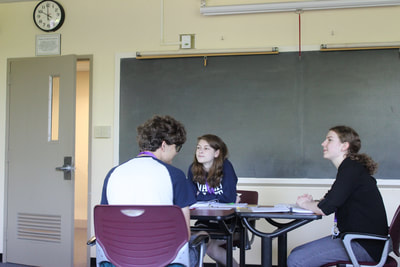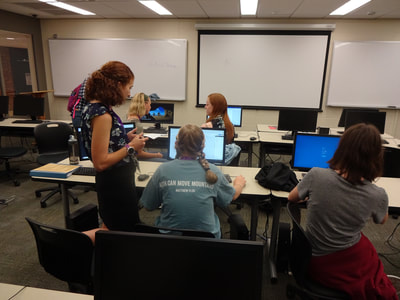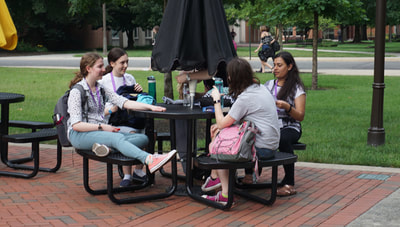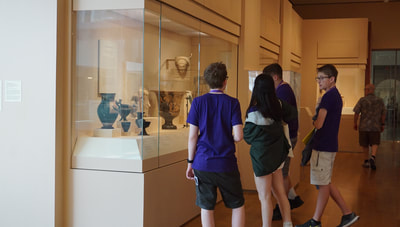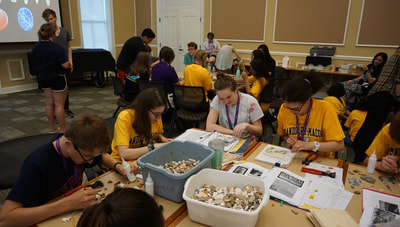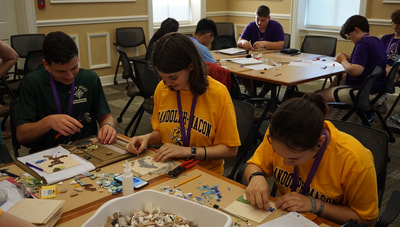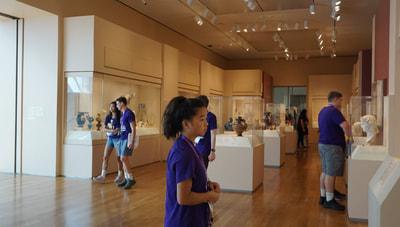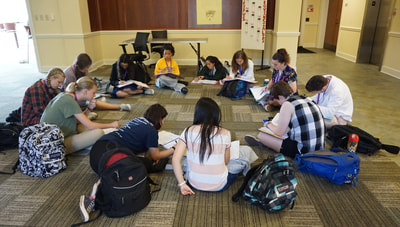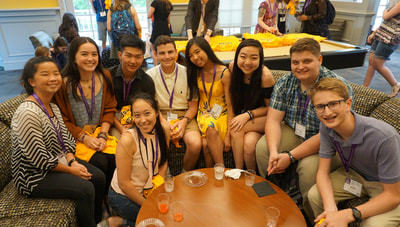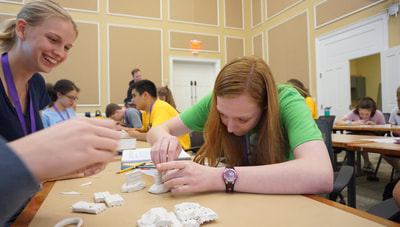|
Salve! Today was Bellum Mercium: Commodity Wars. Lasting a grand total of six hours, the game consisted of six 45 minute "years" in which provinces competed with each other to build the greatest empire and win points for the game. Each province had certain commodities native to its regions, but trading and alliances were necessary to build up armies and feed citizens. Played on a map based on the Mediterranean, the game taught us a lot about the ancient world. Building up a large empire required more attention, resources, and strained allegiances towards other provinces. Additionally, each new year brought about the reign of a new "emperor," (Magister Gallagher) who heavily influenced the game by introducing new rules each round and accepting bribes. The results were suprising; Athens stole first place with its agressive military actions. Following Athens, Roma took second place, and Gallia third. Though some provinces were less successful in securing a high ranking in the game, they received points for bonus categories such as creativity, team spirit, and best use of Latin during the game.
2 Comments
Hip hip hooray! To celebrate the country's birthday, today was run a little bit differently than usual. Elective classes took place in the morning followed by an afternoon full of competitions with the Japanese Academy and a movie. Each of us was able to choose two elective classes ranging on a variety of topics including a study of the Iliad in context of the Bronze Age, a discussion about monsters and their reflection on the society which created them, and even a debate concerning the benevolent dictatorship versus corrupt Senate in regard to the Roman's success in government. These classes enabled us to both expand our existing knowledge about the ancient world while exposing us to new topics we found interesting. They also provided a space in which to grow in our ability to clearly articulate different viewpoints in academic environments. Following classes, we joined with the students of the Japanese Academy to participate in a series of fun competitions cleverly dubbed the "Silk Road Games." These consisted of a trivia contest, musical chairs, an impromptu art competition, and ended in a water balloon toss/fight! It was a lot of fun and a great way to build the community among the two academies here on campus. The contest also offered Latin academy students a way to branch off from their provinces and meet new people in GLA, as the groups competing in the games were randomly assigned. The day ended with a screening of Nausicaa of the Valley of the Wind, a Japanese anime movie following the story of a young princess named Nausicaa. One of Magister Gallagher's favorite movies, though not an academic film, Nausicaa of the Valley of the Wind was an instant hit here at GLA! Tomorrow, we are looking forward to another activity promoted by Magister Gallagher: Bellum Mercatum! Today was a special day at GLA because we were able to listen to Dr. Bartolo Natoli's lecture on gender and sexuality in Rome. It was a very unique lecture that explored subject material new to all of us. Afterwards, we viewed Orfeu Negro (Black Orpheus), a retelling of the ancient myth of Orpheus and Eurydice set in 1950s Rio de Janiro. The film follows Orpheus as he travels towards the Underworld to attempt to retrieve his love. However, the movie is set in the (semi) modern day, so it utilizes creative liberties and symbolism to tell the story in a modern sense while staying true to its mythological roots. Tomorrow is the 4th of July so we are getting ready to don our patriotic wear and celebrate with a day full of elective classes (ranging from discussions on monsters in mythology to a glimpse into the life of the Celts), games with the Japanese Academy, and a movie at the end of the day. Today was another exciting day of Latin academy full of play practice, gym time, and lots of mail. The cast members continued memorizing their lines (which are in Latin, by the way) while the rest worked on a variety of tasks including the play's set, Nuntia (first edition is being published on the 6th!), and Memoranda. We also painted the sculptures that we created a few days ago, along with new panel paintings inspired by our provinces. Panel paintings were traditionally painted with either encaustic or tempera paints and were used to decorate homes and sometimes sarcophagi. Thank you to all of the friends and family who have sent letters over the past week. After a long weekend, students got many letters from home this afternoon. We are thankful for all of your kind words; they are a nice reminder of home. Today we had a special treat in the computer labs: the internet! We each had thirty minutes to message friends, catch up on the news, or read comments on a certain Governor's Latin Academy blog (more pictures will be coming). We then had afternoon Greek classes where we looked at power in Hellenistic art, declined Greek nouns, and learned more about the provinces of the ancient Roman empire. After our afternoon classes, we filed into the theater in Brock Commons for a screening of A Funny Thing Happened on the Way to the Forum. The movie is a comedy released in 1966 inspired by a play written by Plautus, called Pseudolus, the same play that we will be performing on the 14th of July! The movie features a tricky slave named Pseudolus, who helps his master's son find love in a hectic and often humorous manner. After the movie, we discussed the different features of the film that contributed to its humor and brainstormed how to incorporate those elements into our production of Pseudolus. Following the movie, we exited through the front doors of Brock Commons towards the fountain for a Governor's Latin Academy tradition - Volvifolium (literally, turning of the leaf) - to mark the end of the first week. While we are sad knowing that one third of the Academy is already over, we are looking forward to the two thirds to come. note: the pictures below are from the previous week Today was another Latin day, filled with discussions of ancient art, expanded vocabularies, and lots of translating. The afternoon was filled with play practice and continued progress on the Nuntia and Memoranda projects. After dinner, we went to a local kitchen to cook and eat some traditional ancient foods. We made cucumes cocti (braised cucumbers), lenticula (lentils), moretum (a cheese dip), puls punica (Carthage porridge - similiar to oatmeal), and a sweet feta and honey cheese desert dish served with Wheat Thins. While some dishes were well received by most, others were an acquired taste and appealed to only a few students. Regardless, it was eye opening to taste the new foods and to experience different parts of ancient Roman culture.
After cooking, we returned to Andrews Hall for a game night planned by the tribunes. Following a friendly round of Mafia, we enjoyed several other games including Monopoly, B.S., and Seven Wonders. It was a great way to end not only the day but a week packed full of learning. Our day started out with a trip to the Virginia Museum of Fine Arts. We toured the ancient Greek horses exhibit, which included pieces dating back to as far as 2400-2500 BCE. We then split into our provinces for a scavenger hunt throughout the museum, which involved translating Latin questions and composing thoughtful responses about the artworks in Latin. Afterwards, we were able to view the other exhibits containing art from around the world, including Southeast Asia, Africa, India, and the Americas.
After dinner, we crafted jewelry, mosaics, and Intaglio (small engravings traditionally made on precious gems - or in this case, colored Sculpy) in a style native to our provinces. We will sell the products we produced in the Mercatus Traiani (Market of Trajan) in the following weeks. Tomorrow will be a "Latin day" and we will attempt to cook ancient Roman and Greek recipes. Yummy! We had another exciting day of Greek today, after which we listened to UVA Professor, Dr. John Miller, speak on Ovid's effect on fine art. Dr. Miller linked Ovid's literature to famous paintings and sculptures. He showed the connection between the famous author's version of myths and that of renowned artists such as Titian and Rembrandt. After the thought-provoking lecture, we split up to work on Nuntia, Memoranda, and the play. Actors memorized their lines, writers for the Nuntia (Academy newspaper) interviewed faculty, and those working on the Memoranda project began working on their video to memorialize our time here.
Following dinner, we headed towards Brock Commons for a screening of the movie adaptation of "Iphigenia". The movie follows the story of the play written by Euripides in which the main character, Iphigenia, is sacrificed by her father in a tragic string of events. Though shot roughly forty years ago, the movie had an immediate impact on us. As we watched, we were looking for connections to Greek tragedy and later analyzed the film for its cinematic themes and vices. We are looking forward towards our first field trip tomorrow to the Virginia Museum of Fine Arts. After morning classes, we met at Brock Commons for a special treat: Crustula cum Consule (Cookies with the Consul). Each member of the Academy was able to meet the president of Randolph-Macon, receiving cookies and a t-shirt in the process. Afterwards, we began the visual and material culture activity, which involved breaking into our provinces to create miniature clay sculptures. We attempted to emulate the art styles of our provinces as we made our "marble" sculptures that will be sold later during our Roman forum exercise.
Throughout our time at the Academy, we have been grouped into provinces that are competing in the Province Cup competition. Tonight was round one of a series of challenges; tonight's challenge involved pop culture. Germania managed to outscore all other provinces, scoring five points, with the provinces of Gallia, Alexandria, and Ephesus trailing with four, Athens and Britannia with three, Carthage with two, Roma with one, and lastly Hispania with a total score of zero points. Today, we continued to progress our Latin language and culture skills but we are ready to tackle our second day of Greek tomorrow. After days of hard campaigns filled with graffiti and bribery, the elections of the Virginia Governor's Latin Academy XXXI took place. Following speeches, the students voted on the positions of Quaestor, Tribune, Aedile, Praetor, Consul, and Censor. Entrusted with the duties of trash collection and running Epistulae (mail time), Michael and Sathvika were elected as Quaestors. The students elected Julia and Reid as their Tribunes, in charge of organizing social activities. Two Aediles, Tim and Camille, were elected to write the GLA blog and Tori D and Cameron were elected as Praetors to plan and implement sports activities during the course of the Academy. MM and Oliver stepped into their roles as co-consuls of the Academy, liaisons between students, guest speakers, and magistri (teachers). After a rare tie between Oliver and Lizzie, students voted by foot to decide the final consulship by a margin of one vote. Finally, Kylie and Atesh were elected as Censors, tasked with waking up students and accounting for their whereabouts. The new leadership is excited and up to the task of helping the Academy run smoothly.
In addition to elections, today was the first Greek day for students. For many, this was their first exposure to Greek language. Though difficult, the students rose to the challenge of learning the Greek alphabet. It may sound difficult, but after participating in the first Greek Drill of the Academy, everyone began to take their first steps in Greek by reciting the first two lines of the Odyssey. After an eventful day, everyone is ready to hit the hay to be ready for tomorrow. |
Salvete!This blog will document the MMXVIII session of the Virginia Governor's Latin Academy. After elections are held, the aediles will be responsible for its upkeep. Contact Us
Email: valatinacademy@gmail.comOffice Phone: (804) 496-1589 Mailing Address: (student's name) c/o Governor's Latin Academy Randolph-Macon College P.O. Box 5005 Ashland, VA 23005 GLA Checklists
Download these and use them to help with packing: GLA Clothing Checklist GLA Essentials Checklist GLA School Supplies & Optional Checklist Suggested Texts-
NOT REQUIRED Again, these are not required and I would only get one from each category, if any. Latin Lexicons a. Conversational Latin for Oral Proficiency b. Cassell's Concise Latin-English, English-Latin Dictionary c. Collins Latin Concise Dictionary Greek Texts/Lexicons a. Athenaze, Book I b. From Alpha to Omega c. Alpha is for Anthropos d. Pocket Oxford Classical Greek Dictionary Translation Texts a. Iliad Daily Life Books a. Everyday Life in Ancient Rome b. Peoples of the Roman World c. A Day in the Life of Ancient Rome d. Daily Life in the Roman City Vestes Romanae
You will need Roman clothing for several of our activities. You might not always have much time between these events, so you might want to bring more than one outfit. Patterns An Overview I & II Simple Tunica, Stola, and Palla Patterns Legio XX's Civilian Clothing Another Simple Dress Pattern Greek Patterns Simple Tunic and Toga Patterns Peplos Pattern Legio XX's Military Clothing Officers of the Academy
Censors: Consuls: Praetor: Aedile: Tribune: Quaestor: |
